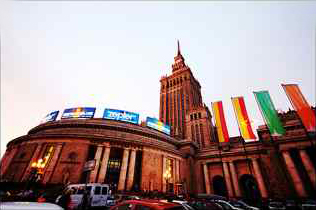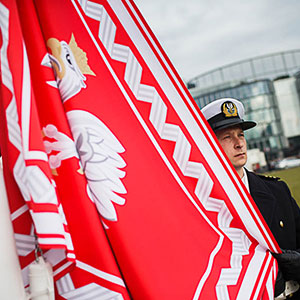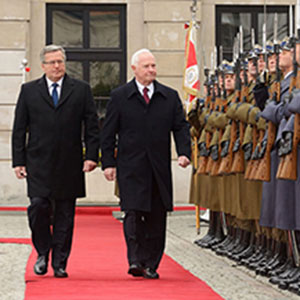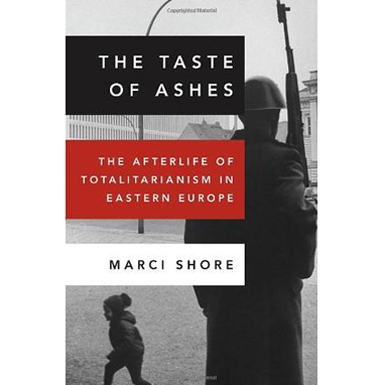 The diversity and complexity of opinions reflecting the different experiences or understanding of different generations neatly encapsulate the dilemma facing Polish society and public life even today, namely what role does Poland’s past have to play in its present and future? The Economist points out in a recent article that visiting Central/Eastern European former-Communist countries is almost impossible without being constantly reminded of the bleakness of a country’s past rather than the brightness of its potential:
The diversity and complexity of opinions reflecting the different experiences or understanding of different generations neatly encapsulate the dilemma facing Polish society and public life even today, namely what role does Poland’s past have to play in its present and future? The Economist points out in a recent article that visiting Central/Eastern European former-Communist countries is almost impossible without being constantly reminded of the bleakness of a country’s past rather than the brightness of its potential:
Visitors to eastern Europe expect beautiful old buildings (Hanseatic, Art Nouveau, Baroque, Ottoman or Levantine) and miserable history, plus fiery drinks, unhealthy food, peasant handicrafts and folk-dancing. All the more reason, therefore, to offer them something that shakes their stereotypes, emphasising modernity, innovation, creativity, optimism and other notions not normally associated with the ex-communist world.
To complain, as the article does, that visitors to Warsaw are too busy at the Museum of the Warsaw of Uprising (or indeed the Palace of Culture) to visit Warsaw university’s spectacular modern new library, is not to question the museum’s importance. But the implication is that Poland’s insecurity about its past is holding it back. There’s no point expending energy on jealously protecting national history and culture when these are no longer under threat. So to put it more obtusely: is it time everyone just ‘moved on’?
There are of course many things to be optimistic about in present-day Poland. It is now freer, safer and more prosperous than perhaps ever before. A series of anniversaries in 2009 highlighted the scale of achievement. Twenty years since the fall of Communism and the victory of Solidarity. Ten years since joining NATO. Five years since joining the European Union. Poland has moved from being a recipient of aid to a donor of aid. It now offers protection to its neighbours rather than needing protecting from its neighbour. It demonstrates its worth to NATO by being one of the few countries whose soldiers operate in Afghanistan without caveats. It was the only EU member to register economic growth in 2009 (1.2%). It now has a moderate, sensible government, and the majority of economic and social indicators are moving in the right direction.
But there are still some historical ‘battles’ left to be won. Misperceptions, some extremely damaging, persist. Stephen Fry, a famous British actor loved in Britain for his formidable intellect, said in October 2009 on national television that,”There’s been a history, let’s face it, in Poland of a right-wing Catholicism which has been deeply disturbing for those of us who know a little history and remember which side of the border Auschwitz was on”. A month earlier, Seamus Milne of The Guardian had written an article shortly after the 70th Anniversary of the beginning of the Second World War, which was being marked by world leaders in Gdańsk. He suggested that “Fed by the revival of the nationalist right in eastern Europe and a creeping historical revisionism that tries to equate nazism and communism, some western historians and commentators have seized on the 70th anniversary of Hitler’s invasion of Poland this month to claim the Soviet Union was equally to blame for the outbreak of war.” To suggest otherwise, he claimed, “is a mendacity that tips towards Holocaust denial.” He suggests, as do many in Russia, that Poland was complicit in the beginning of the Second World War.
Such views are not just eye-wateringly misleading and offensive. They have real present-day implications for Poland and other Eastern European states in the present day. The rehabilitation of the Soviet regime not only helps Russia’s current authoritarian regime domestically, it also helps it to justify its policy of demanding the privileged of maintaining spheres of influence in what it calls its ‘near-abroad’. This may no longer include Poland but it does include Ukraine, while Poland needs a stable and prosperous Ukraine as a fundamental matter of national interest. Western European misunderstanding of and lack of sympathy for Eastern European concerns about Russia means that despite Russian military exercises in Belarus (entitled “West”) and the Baltic, Eastern European NATO members are not even covered by any formal contingency plans for an attack from the East. Germany and Italy deemed contingency plans to protect members of a mutual security alliance to be ‘provocative’.
On another note, prevailing stereotypes also mean countries from the region do not get their fair share of jobs in international organisations, especially the EU. Asked to pick the odd one out from a list of Poland, Bulgaria and Greece, Greece tends to spring to the front of the Western mind before Poland does. There is a need to fight such misperceptions about Poland and that is not at all the same as being ‘stuck in the past’.
_________
Within Poland, the past can intrude as a divisive element, especially the more recent past concerning the post-Communist transformation. Perhaps the most basic divide is expressed through the artificially constructed narrative of the ‘Winners’ and ‘Losers’ of the transformation to a free-market economy. When we talk of Poland now being ‘dynamic’, ‘modern’, ‘optimistic’, we are talking of the country as a whole, and hopefully the majority of the population. But a huge number of people also lost out. Many of those who benefited from the ‘shock therapy’ of economic reform were, to varying degrees, undeserving, unscrupulous, and unfairly renumerated. Foreign investment may have been absolutely necessary, but as foreign investors made fortunes whilst many average Poles lost their jobs, resentment was unavoidable. Communist officials of the dying regime were best-placed to survey the landscape for commercial opportunities and best-equipped to exploit them, whilst many ‘blue-collar’ workers who had been guaranteed work under the old regime lost their jobs as the economy was modernised.
The example of Solidarity is an illuminating case in point. As the first independent trade union movement in the workers’ paradise of the Soviet bloc, the organisation was a highly symbolic and effective vehicle for opposition to the Communists in Poland – disparate groups and individuals united by a common cause. Independence regained, those who had fought for it went their own way. But although Solidarity was so much more than a trade union, it was a trade union nonetheless, and had many members whose primary concern was the security and conditions of their employment and welfare – and in this sense, they were the turkeys who voted for Christmas. As Adam Michnik said in 1999, “In Poland the workers from large industrial enterprises, by their strikes, achieved freedom. And during the period of economic transformation, it was these same workers who were the first to become the victims of this transformation.” They would inevitably come into conflict with the new generation of politicians and employers – some post-Communists, some ex-Solidarity – who were in the process of modernising the economy.
The fallout from transformation does not just include economic grievances. Many people have seen former Communist officials or collaborators rise to prominent positions in society. For example, a woman who missed her final high school exam in 1986 because she was thrown in jail for distributing opposition pamphlets in Communist Poland has had to watch on as her prosecutor rose to prominence as a high-ranking member of post-Communist Poland’s legal establishment. Cases like these led to a policy of excluding from public office those who had lied about their past, as recorded in their secret police file – a policy called ‘lustration’.
Thousands informed on their neighbours, friends and family, but many did so under duress, or to protect their families. Many were also erroneously recorded as collaborators when they were nothing of the sort. When my father was studying in Kraków in the 1960s, he shared a student dorm with a Polish student. The student was told to write a report on this suspicious Westerner. So he went straight upstairs and told him cheerfully that he was to report on him, and what should he write? They sat down together and wrote a report saying that all my father was interested in was football (which is even now not too far from the truth…). In the records, this student was a Communist collaborator, when in fact he had treated the authorities with utter disdain. Many innocent people were inevitably falsely accused and had their lives ruined, as people who had been wronged in the past continued to see those who had made them miserable climb the ladder.
The ‘losers’ therefore include not only the old, poor, and less educated – but also people with all kinds of reasons to feel betrayed, and at a deeply personal level. These emotions were open to exploitation by various political movements. Fear or resentment of foreign ‘exploitation’ might make someone support a left-wing trade-union movement, or an ultra-conservative and nationalist religious movement, or both. The same person might rail against the ‘empire-building’ of the European Union whilst depending on its subsidies. A political party could promise Poland’s ‘purification’ to those who were not satisfied that lustration had gone far enough.
This fault line fuels the rivalry between Poland’s main political parties. For a while in the mid-2000s it seemed that Poland had had enough reform stuffed down its throat and was about to throw it all up again, but it has stepped back from the brink. It became clear that people’s legitimate grievances about transformation, as well as the fears and prejudices of underprivileged people, were being exploited for political gain, and this was poisoning Poland’s political culture and foreign relations. This can be seen in two ways. It is true that the unedifying recriminations of that period have give an already cynical and jaded population more reason to despair. But many people also seem to have decided that a need for justice has been manipulated into a desire for revenge, and now want to move on.
So to return, finally, to attitudes towards the Palace of Culture, and how it reflects these issues. To some a symbol of Poland’s humiliation at the hands of Soviet oppression, to others it represents a kind of defiance to the excesses of the post-Communist transformation, standing surrounded but not as yet overshadowed by gleaming skyscrapers and massive billboards. Such differing opinions reflect the complexity of Poland’s relationship with its past. But the prevailing opinion amongst my friends and colleagues in their twenties and thirties is that it is a piece of history, for better or for worse, and that there are far more important things to attend to. After winning its battle for national survival in the 1980s, struggling through the flux of transformation in the 1990s, and avoiding a catastrophic U-turn in the 2000s, the past is no longer holding Poland back as it did. With any luck, the next decade will be one of blissfully mundane progress. And if there is one thing absolutely everyone can agree on it is this: if someone really wants to blow up a Communist-era building in the centre of Warsaw, please make it the railway station.
CR
What do you think … we tore down the wall but should we tear down the Palace?
Imagery
Palace of Culture in Warsaw, Poland by Christopher Walker



